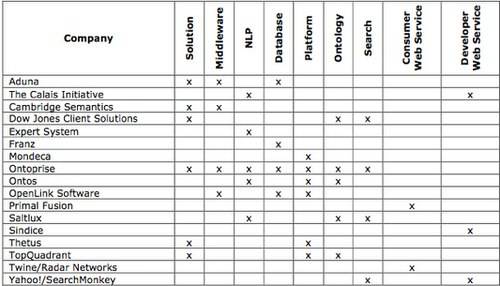Semantic Web entrepreneur David Provost has published a report about the state of business in the Semantic Web and it’s a good read for anyone interested in the sector. It’s titled On the Cusp: A Global Review of the Semantic Web Industry. We also mentioned it in our post Where Are All The RDF-based Semantic Web Apps?.

The Semantic Web is a collection of technologies that makes the meaning of content online understandable by machines. After surveying 17 Semantic Web companies, Provost concludes that Semantic science is being productized, differentiated, invested in by mainstream players and increasingly sought after in the business world.
Provost aims to use real-world examples to articulate the value proposition of the Semantic Web in accessible, non-technical language. That there are enough examples available for him to do this is great. His conclusions don’t always seem as well supported by his evidence as he’d like – but the profiles he writes of 17 Semantic Web companies are very interesting to read.
What are these companies doing? Provost writes:
“..some companies are beginning to focus on specific uses of Semantic technology to create solutions in areas like knowledge management, risk management, content management and more. This is a key development in the Semantic Web industry because until fairly recently, most vendors simply sold development tools.”
The report surveys companies ranging from the innovative but unlaunched Anzo for Excel from Cambridge Semantics, to well-known big players like Down Jones Client Solutions and RWW sponsor Reuters Calais Initiative, to relatively unknown big players like the already very commercialized Expert System. 10 of the companies were from the US, 6 from Europe and 1 from South Korea.

Above: Chart from Provost’s report.
We’ve been wanting to learn more about “under the radar” but commercialized semantic web companies ever since doing a briefing with Expert System a few months ago. We had never heard of the Italian company before, but they believe they already have they have a richer, deeper semantic index than anyone else online. They told us their database at the time contained 350k English words and 2.8m relationships between them. including geographic representations. They power Microsoft’s spell checker and the Natural Language Processing (NLP) in the Blackberry. They also sell NLP software to the US military and Department of Homeland Security, which didn’t seem like anything to brag about to us but presumably makes up a significant part of the $12 million+ in revenue they told Provost they made last year.
And some people say the Semantic Web only exists inside the laboratories of Web 3.0 eggheads!
Shortcomings of the Report
Provost writes that “the vendors [in] this report have all the appearances of thriving, emerging technology companies and they have shown their readiness to cross borders, continents, and oceans to reach customers.” You’d think they turned water into wine. Those are strong words for a study in which only 4 of 17 companies were willing to report their revenue and several hadn’t launched products yet.
The logic here is sometimes pretty amazing.
The above examples [there were two discussed – RWW] are just a brief sampling of the commercial success that the Semantic Web has been experiencing. In broad terms, it’s easy to point out the longevity of many companies in this industry and use that as a proxy for commercial success [wow – RWW]. With more time (and space in this report), additional examples could be described but the most interesting prospect pertains to what the industry landscape will look like in twelve months. [hmmm…-RWW]
In fact, while Provost has glowingly positive things to about all the companies he surveyed, the absence of engagement with any of their shortcomings makes the report read more like marketing material than any objective take on what’s supposed to be world-changing technology.
This is a Fun Read
The fact is, though, that Provost writes a great introduction to many companies working to sell software in a field still too widely believed to be ephemeral. The stories of each of the 17 companies profiled are fun to read and many of Provost’s points of analysis are both intuitive and thought provoking.
He says the sector is “on the cusp” of major penetration into existing markets currently served by non-semantic software. Provost argues that the Semantic Web struggles to explain itself because the World Wide Web is so intensely visual and semantics are not. He says that reselling business partners in specific distribution channels are combining their domain knowledge with the science of the software developers to bring these tools to market. He tells a great, if unattributed, story about what Linked Data could mean to the banking industry.
We hadn’t heard of several of the companies profiled in the report, and a handful of them had never been mentioned by the 34 semantic web specialist blogs we track, either.
There’s something here for everyone. You can read the full report here.










